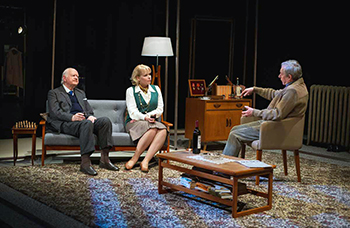We've been watching the streamed version of A Splinter of Ice, Ben Brown's play about a meeting between novelist Graham Greene and the Soviet spy Kim Philby. We liked it so much, we watched it twice!

One of the companies that have been streaming plays on the internet during lockdown is the Original Theatre Company. For us, one of last year’s highlights was their production of The Habit of Art, Alan Bennett’s play imagining a reunion between composer Benjamin Britten and poet W H Auden. That starred Matthew Kelly and David Yelland and was filmed here in Eastbourne at the Devonshire Park Theatre. This year, one of their productions, streaming until the end of this month, and currently on a short regional tour, concerns another reunion – this time one that actually happened – between the Soviet spy Kim Philby and the author Graham Greene.
In Ben Brown’s play, the year is 1987. An 83 year old Greene has been invited to Moscow to attend a conference on world peace held at the behest of the liberalising Soviet leader Mikhail Gorbachev. Whilst there, he decides to look up Philby, who had been living in the city since fleeing eastwards in 1963. An evening dinner is arranged. During Greene’s wartime career in MI6, Kim Philby was his boss for a while, and they’d become friends, but they’d not seen each other for thirty years.
Controversially, Greene had written a foreword to Philby’s memoirs, My Silent War, published in 1968, but later left no account of the 1987 meeting, so what follows is the playwright’s account and very compelling it is too.
War framed this relationship – the hot war against the Nazis and the Cold War between east and west. The latter gave rise to a whole literature of spy novels by authors such as Le Carré and Greene himself. They often combine the themes of friendship and betrayal, nowhere more so than in Greene’s novella and screenplay The Third Man. The themes are the sub-text for this meeting. Under Greene’s gentle but probing questioning, Philby defends himself against the charge of betrayal of his country, since he claims only ever to have acted in the interests of Communism. He is on less solid ground, though, when he dismisses the death of young agents he had trained and then betrayed as “necessary”.
This was a fine piece of work, rightly praised by the critics, featuring nuanced performances from Oliver Ford Davies as Graham Greene and Stephen Boxer as the famously charming Kim Philby. Admirable support is provided by Sarah Crowe as Philby’s Russian wife Rufa The streamed version we watched (twice, actually – it was so good) featured some very fine camerawork as well.
I’m just about old enough to remember Philby’s disappearance from Beirut in 1963, and the fallout from it. Later, there was the escape of another spy, George Blake, from Wormwood Scrubs prison in 1966, after previously being sentenced to 42 years in prison for espionage. A more vivid memory is the later exposure of the fourth man, Anthony Blunt, in 1979, by Prime Minister Margaret Thatcher in the House of Commons.
In the years since, there have been many plays and several TV dramas about the so-called Cambridge Spies, all seeking to understand and/or explain their actions. There is no doubt that in the thirties, many admired Soviet Communism, seeing it as a bulwark against the rising tide of Nazism. They felt alienated from their own governments, which at the time appeared to be supine and ineffective. Indeed, many in political circles advocated closer ties with the Nazi regime, seeing it as a bulwark against Communism.
Now, we have the benefit of hindsight: we have learned just how right people were to fear the rise of Hitler and his henchmen. Unfortunately for the spies, though, history has also proved that the regime they were supporting was just as vicious, ruthless and murderous – surviving longer and responsible for the death of many more millions.
A Splinter of Ice is a fine piece of work, reminding us powerfully of the conflict between the political and the personal. It was the novelist E M Forster who famously said, “If I had to choose between betraying my country and betraying my friend, I hope I should have the guts to betray my country.” However, as another novelist, Julian Barnes, remarked in the aftermath of the Blunt affair, “If you betray your country, you by definition betray all your friends in that country..." The conflict between those two viewpoints is explored in the play, but ultimately remains unresolved.
History shows us that both Philby and Greene died within four years of their reunion. Ironically enough, so did the Soviet Union.




